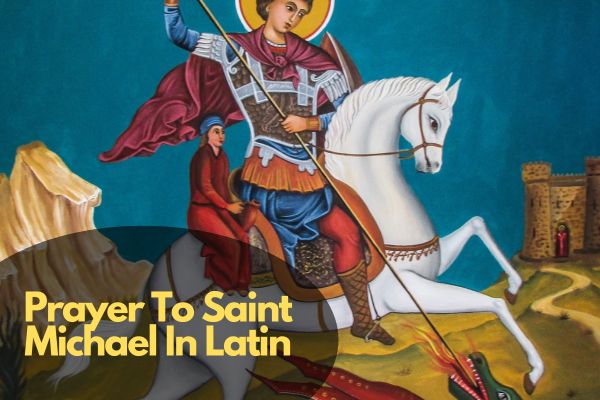Saint Michael, the celestial warrior against darkness, is invoked with reverence and devotion, seeking his intercession through the elegant cadence of Latin words. This article embarks on a journey to explore the profound significance of the Prayer to Saint Michael in Latin, looking into the spiritual richness and timeless power encapsulated within each syllable.
As we unravel the threads of this sacred tradition, we delve into the origins, the linguistic beauty, and the profound spiritual impact of reciting this prayer in the language that has adorned countless liturgies and hymns throughout history. Join us on this pilgrimage into the heart of divine communication, as we explore the depth of meaning and connection that arises when one utters the prayer to Saint Michael in the venerable tongue of Latin.
Prayer To Saint Michael In Latin
Certainly! The prayer to Saint Michael the Archangel in Latin is known as the “Sancte Michael Archangele” or “Saint Michael Prayer.” Here it is:
Sancte Michael Archangele,
defende nos in proelio;
contra nequitiam et insidias diaboli esto praesidium.
Imperet illi Deus, supplices deprecamur:
tuque, Princeps militiae Caelestis,
satanam aliosque spiritus malignos,
qui ad perditionem animarum pervagantur in mundo,
divina virtute in infernum detrude. Amen.
Translation:
Saint Michael Archangel,
defend us in battle;
be our protection against the wickedness and snares of the devil.
May God rebuke him, we humbly pray;
and do thou, O Prince of the Heavenly host,
by the power of God, thrust into hell
Satan and all evil spirits
who wander through the world seeking the ruin of souls. Amen.
Significance Of The Prayer To Saint Michael In Latin
The Prayer to Saint Michael in Latin (“Sancte Michael Archangele…”) holds significant meaning for several reasons:
Historical Context
Composed by Pope Leo XIII: The prayer originated in 1884 after Pope Leo XIII reportedly had a terrifying vision of a battle between the Church and Satan. In response, he composed several prayers for protection, including the one to Saint Michael.
Symbol of Protection: This historical context imbues the prayer with a sense of urgency and defense against spiritual attacks on the Church and its faithful.
Theological Meaning
Invoking Saint Michael: St. Michael is considered the leader of the angels and is traditionally associated with battling evil forces. Invoking him represents appealing to God’s ultimate power for protection against temptation and spiritual harm.
Specific Requests: The prayer articulates specific pleas, including God’s rebuke of the devil, St. Michael’s role in casting evil spirits back to hell, and protection from the snares and malice of evil.
Expression of Dependence on God: By acknowledging our human vulnerability and the need for divine intervention, the prayer emphasizes our dependence on God’s grace for spiritual victory.
Continuing Importance
Catholic Tradition: Though no longer part of the official ending of every Mass, the prayer remains recited by many Catholics individually or in group settings.
Call to Action: Pope Francis’s 2018 request for Catholics to pray this prayer again highlights its significance in combating evil and promoting the Church’s renewal.
Personal Devotion: Many find comfort and strength in reciting the prayer, experiencing it as a way to seek protection and guidance in their personal lives.
Conclusion
In the quiet echoes of Latin syllables, the Prayer to Saint Michael becomes a bridge between the earthly and the divine, a timeless expression of faith that transcends the boundaries of language and culture. As we conclude this exploration into the spiritual significance of invoking Saint Michael in Latin, we find ourselves standing at the crossroads of tradition and contemporary devotion. The Latin prayer to Saint Michael serves as a reminder that, in the pursuit of divine connection, language becomes a conduit for the soul’s deepest yearnings.






